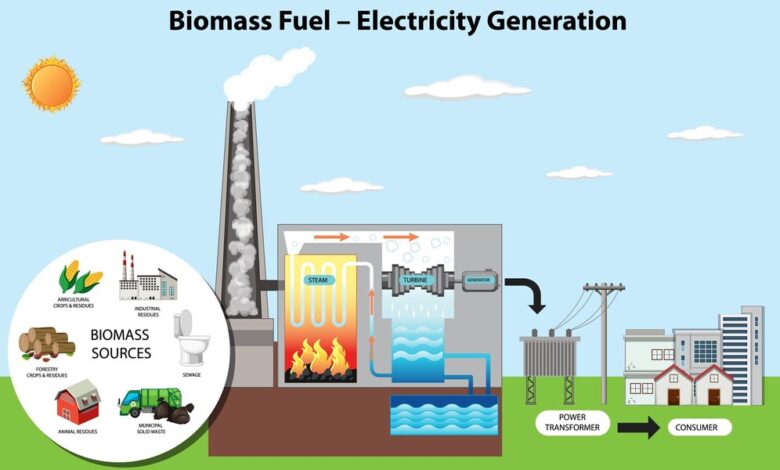
Biomass energy is often overlooked in discussions about renewable energy. Despite its potential, misconceptions cloud its reputation. If you’re an environmentalist, energy professional, or student, this guide will help debunk myths and shed light on the many benefits of biomass energy.
Introduction to Biomass Energy
Biomass energy converts organic materials into power. These materials include wood, agricultural waste, and even algae. It’s part of the renewable energy family, aiming to reduce our reliance on fossil fuels. Biomass energy is versatile. It can generate electricity, heat, and even fuel for transportation.
Understanding its role in renewable energy helps us appreciate its potential. By harnessing natural materials, biomass energy contributes to a sustainable future. Plus, it offers solutions for managing waste effectively.
Common Misconceptions about Biomass Energy
Misconception 1: Biomass Energy Is Not Environmentally Friendly
One common misconception is that biomass energy harms the environment. Critics argue that burning organic material releases carbon dioxide. However, the carbon cycle of biomass is different from fossil fuels. Plants absorb carbon dioxide as they grow. When burned, they release the same amount of carbon they absorbed, making it a balanced exchange.
Misconception 2: Biomass Energy Is Inefficient
Another myth is that biomass energy is inefficient. While it may not match the efficiency of some other renewables, advancements in technology are closing the gap. Modern biomass facilities are designed to maximize energy output and minimize waste. The efficiency of these systems continues to improve.
Misconception 3: Biomass Energy Is Not Sustainable
People often think biomass energy isn’t sustainable. They worry about deforestation and resource depletion. Sustainable practices, however, can address these concerns. Using agricultural waste, for example, doesn’t require cutting down trees. Additionally, fast-growing plants like switchgrass can be harvested sustainably.
Benefits of Biomass Energy
Reducing Greenhouse Gas Emissions
Biomass energy plays a crucial role in mitigating climate change. By replacing fossil fuels, it helps reduce greenhouse gas emissions. The carbon-neutral cycle of biomass ensures that no extra carbon dioxide is added to the atmosphere.
Boosting Local Economies
Biomass energy can stimulate local economies. It creates jobs in farming, processing, and energy production. Local biomass projects often rely on regional resources, boosting local businesses and communities.
Providing a Reliable Energy Source
Unlike solar and wind, biomass energy is not weather-dependent. It offers a stable and reliable energy source. This reliability makes it a valuable part of the renewable energy mix, ensuring consistent power supply.
Case Studies of Successful Biomass Energy Projects
Burlington, Vermont’s Biomass Plant
Burlington, Vermont, is a shining example of biomass energy success. The city’s biomass plant generates electricity for the entire community using wood chips. This project has significantly reduced Burlington’s reliance on fossil fuels.

Sweden’s District Heating System
Sweden has embraced biomass energy in its district heating systems. These systems use waste wood and other biomass materials to provide heat to entire neighborhoods. Sweden’s approach demonstrates how biomass can integrate into existing energy infrastructures.
India’s Biomass Gasification Projects
In India, biomass gasification projects are transforming rural energy access. These projects convert agricultural waste into clean, reliable electricity. They offer a sustainable solution to energy poverty in remote areas.
The Future of Biomass Energy
Technological Advancements
The future of biomass energy looks promising. Technological advancements are enhancing efficiency and sustainability. Innovations in gasification and pyrolysis are making biomass conversion more effective.
Expanding Applications
Biomass energy’s applications are expanding. Beyond electricity and heat, it can produce biofuels for transportation. This versatility makes biomass a key player in the transition to a low-carbon economy.
Policy Support and Investment
Government policies and investments are crucial for biomass energy’s growth. Supportive policies can drive research and development. Increased investment will help scale up successful projects and expand their impact.
Conclusion
Biomass energy is a vital component of the renewable energy landscape. It offers a carbon-neutral, reliable, and versatile energy source. By debunking misconceptions and understanding its benefits, we can appreciate its potential.
Join the Conversation
Let’s rethink biomass energy and its role in our sustainable future. Share this post and engage in discussions about renewable energy. Together, we can promote a cleaner, greener world.



